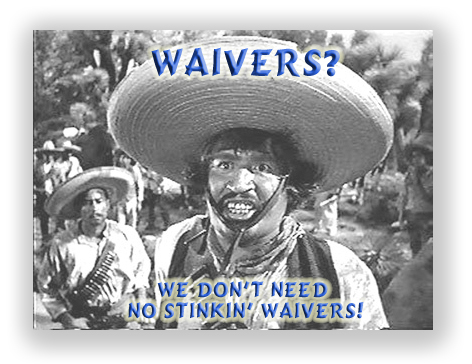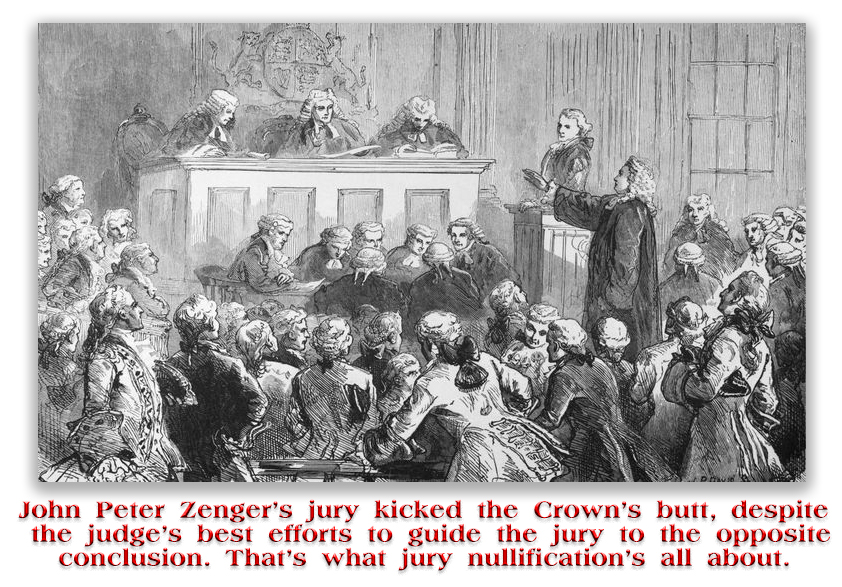We post news and comment on federal criminal justice issues, focused primarily on trial and post-conviction matters, legislative initiatives, and sentencing issues.

6TH CIRCUIT SHUTS DOWN DISTRICT JUDGE WHO DOESN’T LIKE PLEA WAIVERS
Just about any defendant who has ever made a plea deal (about 94% of federal prisoners) has faced a provision in the agreement known as an “appeal waiver”, where the defendant agrees not to appeal or file a 28 U.S.C. § 2255 post-conviction motion except in the most extreme cases. The waivers are often overlooked or underappreciated by the defendant, and rarely explained adequately by defense counsel or the court.
 Still, they’re a boon to the government. A waiver ensures that the defendant will never be back to complain on appeal or habeas corpus about infirmities in the sentencing, whether caused by court error or defense attorney misfeasance. Some creative U.S. Attorneys were even bulletproofing their convictions against future changes in the law or Guidelines that might otherwise entitle the defendant to a lesser sentence. A few go so far as to prohibit the defendant from filing a Freedom of Information Act (5 U.S.C. § 552) request to law enforcement agencies. Ohio State University law professor Doug Berman calls an appeal waiver nothing more than a “(government labor-saving) device” that should be “void as against public policy.”In fact, the Dept. of Justice only two months ago had to stamp out the nascent practice by some U.S. Attorneys requiring a defendant to waive any right to petition for a compassionate release sometime under 18 U.S.C. § 3582(c)(1)(A)(i) in the future. Such motions are based on extraordinary changed circumstances that make a modificationof the sentence an act of compassion.
Still, they’re a boon to the government. A waiver ensures that the defendant will never be back to complain on appeal or habeas corpus about infirmities in the sentencing, whether caused by court error or defense attorney misfeasance. Some creative U.S. Attorneys were even bulletproofing their convictions against future changes in the law or Guidelines that might otherwise entitle the defendant to a lesser sentence. A few go so far as to prohibit the defendant from filing a Freedom of Information Act (5 U.S.C. § 552) request to law enforcement agencies. Ohio State University law professor Doug Berman calls an appeal waiver nothing more than a “(government labor-saving) device” that should be “void as against public policy.”In fact, the Dept. of Justice only two months ago had to stamp out the nascent practice by some U.S. Attorneys requiring a defendant to waive any right to petition for a compassionate release sometime under 18 U.S.C. § 3582(c)(1)(A)(i) in the future. Such motions are based on extraordinary changed circumstances that make a modificationof the sentence an act of compassion.
 ‘What, you’re dying of cancer, Mr. Tax Fraud convict, and you would like to spend your final months dying at home instead in a federal prison? Sorry, Charlie, you waived the right to ask the judge for that in your plea deal six years ago…’
‘What, you’re dying of cancer, Mr. Tax Fraud convict, and you would like to spend your final months dying at home instead in a federal prison? Sorry, Charlie, you waived the right to ask the judge for that in your plea deal six years ago…’
A few judges find appeal waivers so odious that they will not accept a plea deal containing one. One such federal judge is David Lawson, who sits on the U.S. District Court in the Eastern District of Michigan. He got slapped down last week by the 6th Circuit, which granted a writ of mandamus against him for rejecting a plea deal based on his “longstanding practice” of rejecting agreements containing appeal waivers.
During a pretrial hearing in a federal drug prosecution for Ashley Townsend, Judge Lawson told the parties that his “practice over the years has [been to] not… to accept plea agreements that have waivers of rights to collateral review or the right to appeal a sentence determination or sentencing issue that is disputed.” Perhaps because U.S. Attorney Dawn Ison doesn’t give as fig what a federal judge wants, or perhaps because she thought she finally had the perfect test case, Dawn’s office and Ashley signed a plea agreement with appeal waivers anyway.
Judge Lawson was as good as his work. He rejected the proposed deal.
The government filed a petition for writ of mandamus with the 6th Circuit, asking for an order telling Judge Lawson that his practice violated F.R.Crim.P. 11, and that he could not impose such a blanket policy. A writ of mandamus is known as an “extraordinary writ.” It is sort of the obverse of the injunction coin. An injunction is a court order prohibiting someone from committing an act. Mandamus is an order to a lower court or government official directing that something be done.
 In keeping with its ‘extraordinary’ nature, a writ of mandamus is tough to get. A party seeking a writ of mandamus must show that (1) it has no other adequate means of obtaining relief, (2) its right to mandamus is “clear and indisputable;” and (3) the issuance of the writ was “appropriate under the circumstances.”
In keeping with its ‘extraordinary’ nature, a writ of mandamus is tough to get. A party seeking a writ of mandamus must show that (1) it has no other adequate means of obtaining relief, (2) its right to mandamus is “clear and indisputable;” and (3) the issuance of the writ was “appropriate under the circumstances.”
The Circuit agreed the U.S. Attorney was entitled to its writ. The 6th pointed out the government has no right under the law to file an interlocutory appeal of Judge Lawson’s denial of a plea deal, and if Ashley would later plead guilty to the indictment, be convicted by a jury, or be acquitted after trial, the government had no right to a direct appeal in which the Judge’s practice could be questioned. “In this case,” the Circuit said, “mandamus is the only adequate means for the United States either to compel the district court to adhere to Rule 11.”
Second, the 6th ruled, “the district court’s violation of Fed.R.Crim.P. 11 was ‘clear and undisputable.’ Rule 11 prohibits the court from participating in plea discussions… When a district court expresses its preference for or against certain plea-bargaining terms in an unfinalized or hypothetical plea agreement, the Circuit rules, the court impermissibly participates in plea negotiations in violation of Rule 11.”
Here, the Circuit held that the district court abused its discretion by rejecting the parties’ plea agreement without a case-specific “sound reason.” In other words, if the court rejects Ashley’s plea deal because of the presence of the waiver. it needs a reason based on the particulars of Ashley’s situation.
Finally, the 6th said, mandamus is appropriate in this circumstance. The issue had never been decided before, it “involves important questions… which bear on the ‘efficient administration of justice,” and raises “questions that might evade review if not considered at this time.”
 University of North Carolina criminal law prof Carissa Byrne Hessick called this decision “bonkers.” She said this “astonishing decision curtailing trial courts’ power to reject plea bargains… I hope the 6th Circuit decides to hear this case en banc and to reverse this terrible panel decision. Plea bargaining has warped the criminal justice system. And if other courts follow the Sixth Circuit, it will get even worse.”
University of North Carolina criminal law prof Carissa Byrne Hessick called this decision “bonkers.” She said this “astonishing decision curtailing trial courts’ power to reject plea bargains… I hope the 6th Circuit decides to hear this case en banc and to reverse this terrible panel decision. Plea bargaining has warped the criminal justice system. And if other courts follow the Sixth Circuit, it will get even worse.”
Professor Berman said in his Sentencing Policy and Law blog that he “generally agree[s] with the District Court’s stated policy concerns with all appeal waivers: ‘The court explained its belief that appeal waivers “embargo” trial court mistakes, “insulate” the government’s conduct “from judicial oversight,” effectively “coerce” guilty pleas with offers “too good to refuse,” and “inhibit[] the development of the Sentencing Guidelines”‘.”
As usual, the Volokh Conspiracy is succinct about it:
During plea bargaining, prosecutors will often offer criminal defendants an escape from unconscionably long mandatory minimum sentences if they waive their right to appeal their conviction or challenge it on collateral review. It’s a system that’s ripe for abuse and coercion. But, per the Sixth Circuit, that’s no reason for a district judge to have a blanket rule against approving plea deals that contain these waivers. Mandamus-ed!
DOJ, Department Policy on Compassionate Release Waivers in Plea Agreements (March 11, 2022)
Sentencing Law and Policy, Sixth Circuit panel grants mandamus because district judge rejected a plea deal with an appeal waiver the wrong way (April 28, 2022)
In re United States, Case No 21-1318 (6th Cir. April 26, 2022)
Twitter, Carissa Byrne Hessick (April 26, 2022)
The Volokh Conspiracy, Short Circuit: A Roundup of Recent Federal Court Decisions (April 29, 2022)
– Thomas L. Root








